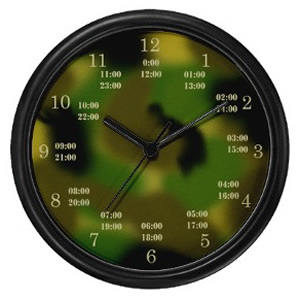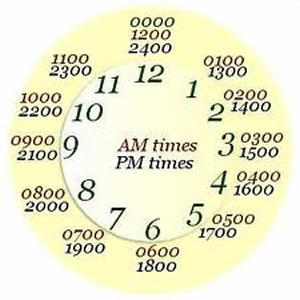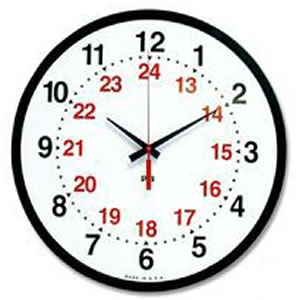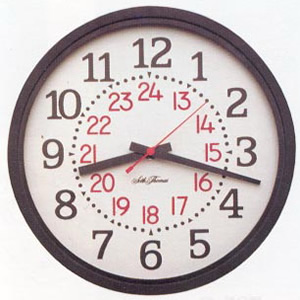
THE BELOW LINKS CONTAIN DETAILED AIRLINE, MILITARY JETS, TEST AIRCRAFT, AIRPLANE FACT SHEETS AND AEROSPACE INFORMATION THE BELOW LINKS CONTAIN AVIATION, MILITARY, AIRCRAFT VIDEOS, PICTURES, FACTS, INFORMATION, AUDIO, HISTORY, MOVIES AND PHOTOS 
THE BELOW LINKS CONTAIN FLIGHT TRACKING, AIRPORT INFO, AVIATION PIONEERS, USAF REFERENCES, NTSB FACTS AND AVIATION WEATHER |
MILITARY TIME INFORMATION
HOW DOES MILITARY TIME WORK?
WHAT TIME IS IT IN MILITARY TIME?
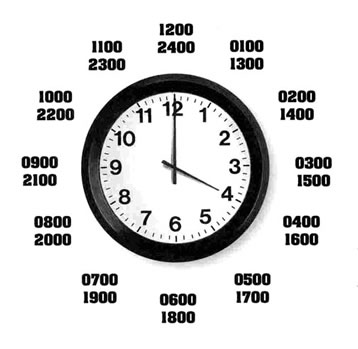 |
| Regular Time | Military Time | Regular Time | Military Time |
|---|---|---|---|
| Midnight | 0000 | Noon | 1200 |
| 1:00 a.m. | 0100 | 1:00 p.m. | 1300 |
| 2:00 a.m. | 0200 | 2:00 p.m. | 1400 |
| 3:00 a.m. | 0300 | 3:00 p.m. | 1500 |
| 4:00 a.m. | 0400 | 4:00 p.m. | 1600 |
| 5:00 a.m. | 0500 | 5:00 p.m. | 1700 |
| 6:00 a.m. | 0600 | 6:00 p.m. | 1800 |
| 7:00 a.m. | 0700 | 7:00 p.m. | 1900 |
| 8:00 a.m. | 0800 | 8:00 p.m. | 2000 |
| 9:00 a.m. | 0900 | 9:00 p.m. | 2100 |
| 10:00 a.m. | 1000 | 10:00 p.m. | 2200 |
| 11:00 a.m. | 1100 | 11:00 p.m. | 2300 |
MILITARY TIME - HOW TO TELL THE TIME WITH MILITARY TIMEThe U.S. military uses the 24-hour clock exclusively and would typically pronounce full hours as the number-word for the hour followed by "hundred" with an optional "hours" ("hours" is not used in the U.S. Navy or the U.S. Marine Corps) to clarify that the speaker is referring to a time of day. For instance, 1600 would be pronounced "sixteen hundred" or "sixteen hundred hours". The time 1830 is usually pronounced "eighteen thirty". 1000 is "ten hundred" rather than "one thousand"; hence, 2000 is "twenty hundred". Both "eighteen o'clock" and "eighteen hundred" are commonly encountered spoken English for 18:00. Contrary to popular belief, the use of the word "hours" at the end of the stated time is not standard in the U.S. military. The use of the 24-hour clock without the word "hours" is the standard for expressing time in the U.S. military. The time 18:05 is commonly pronounced either "eighteen oh five" or "five past eighteen". In U.S. military usage, a leading zero for the hours before 10:00 is pronounced as well, as in "oh three oh five" or as "zero three zero five" for 03:05, but this would be considered unusual in a civilian setting. Taking as an example, on many of the United Kingdom's railways, the public announcement system refers to 24-hour times as: 06:59 "oh six fifty-nine", to 07:00 "oh seven hundred hours". "Midnight exactly" is used for 00:00 (however no train in the United Kingdom is shown to depart at 0000 or 2400 to avoid any ambiguity), but when they depart at, for example, 00:26, it is announced as "midnight twenty-six". It is also common to hear the hour spoken as "seven hours Greenwich Mean Time" (written 07:00, for instance), as heard on the BBC World Service radio broadcasts in the US. On the display boards at Birmingham New Street, mirroring the majority of stations in the UK, and timetables, the time is written as HHMM, as in 0659 or 0700 for 'one minute to-' and 'seven o'clock' respectively. In common with what happens with units, the written and spoken forms of time do not always match. For example, it is possible for a train time to be written as "18:30" but a person may say "there is a train at half-past". In Canada and the United States, the term "military time" is a synonym for the 24-hour clock. In these regions, the time of day is customarily given almost exclusively using the 12-hour clock notation, which counts the hours of the day as 12, 1, ..., 11 with suffixes 'a.m.' and 'p.m.' distinguishing the two diurnal repetitions of this sequence. The 24-hour clock is commonly known there only in a few specialist areas (military, aviation, navigation, meteorology, astronomy, computing, logistics, emergency services, hospitals), where the ambiguities of the 12-hour notation are deemed too inconvenient, cumbersome, or outright dangerous, with the military's use being historically the first and most famous example. The term "military time" has no particular meaning in most other regions of the world, where the 24-hour clock has long become a common element of every-day civilian life.
In the United States military, military time is similar to the 24-hour clock notation, with the exception that the colon is omitted and the time on the hours is often spoken as its decimal value. For instance, 6:00 a.m. would become 0600, and would be spoken as "zero six hundred", "oh six hundred", or "zero six zero zero". However none of these formatting or pronunciation details is in fact exclusively military, and all are common in the technical contexts in which the 24-hour clock is generally used in English-speaking countries. There are some differences between military usage and other twenty-four-hour time systems: * Written military time does not usually include a time separator (for example, "0340" is more common than the civilian "03:40"). The 24-hour time system has been used for centuries, primarily by scientists, astronomers, navigators, and horologists. Numerous examples of clocks using the 24-hour system have been built, ranging from John Harrison's H1 chronometer to the Shepherd gate clock at Greenwich. The British and Canadian militaries first started to use the 24-hour clock in late 1917. Previous to this, military orders were drafted using the familiar "a.m." and "p.m." suffixes. In Britain, the use of the 24-hour clock in daily life has grown steadily since the beginning of the 20th century. In 1934, the Radio Times switched to the 24-hour clock for programme listings. The experiment was halted after five months following widespread protests from readers, and has used the 12-hour clock ever since. More recently, BBC Weather television forecasts used the 12-hour notation for several months in 2005, after its graphical revamp. After complaints from the public, however, this was switched to 24-hour notation. |
© AviationExplorer.com - The Website For Aviation Enthusiasts |



